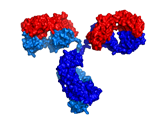
The Rosetta Commons consortium is a group of international researchers from universities, government labs, and the Rosetta Design Group. The purpose of the consortium is to further the research and development of the algorithms behind the Rosetta Software Suite for macromolecular modeling. Revenues from commercial licensing of the Rosetta Suite go directly towards supporting code development, help fund RosettaCon, an annual gathering of consortium members, and allow for dedicated support staff.
The Rosetta algorithms began in the lab of David Baker at the University of Washington, appearing for the first time in the scientific literature in a 1999 paper entitled, Ab Initio Protein Structure Prediction of CASP III Targets Using ROSETTA. The Critical Assessment of Techniques for Protein Structure Prediction (CASP) is a biennial competition of computational protein structure prediction technologies. Researchers in the Rosetta Commons have expanded Rosetta far beyond structure prediction, as described in many publications since Rosetta's debut in 1999.







